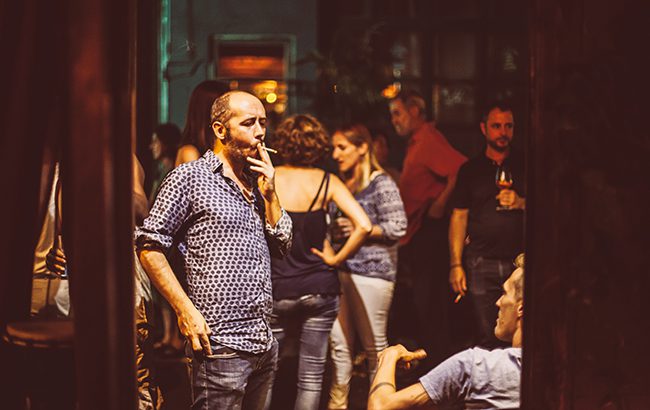The UK hospitality sector is concerned that a potential ban on smoking in pub gardens and outside nightclubs could significantly impact businesses.

The details of any proposals remain unclear, however prime minister Sir Keir Starmer confirmed it was being discussed. Health secretary Wes Streeting has called for a “national debate” on the topic.
Many in hospitality have expressed concerns about how a ban would affect the sector.
Kate Nicholls, chief executive of UKHospitality, said: “A ban on smoking in outdoor spaces comes with the prospect of serious economic harm to hospitality venues. You only have to look back to the significant pub closures we saw after the indoor smoking ban to see the potential impact it could have.
“This ban would not only affect pubs and nightclubs, but hotels, cafes and restaurants that have all invested significantly in good faith in outdoor spaces and continue to face financial challenges.
“The government must embark on a full and detailed conversation with affected parties on the impact of such a ban before any legislation is laid. It must also assess whether such a ban would achieve its aims of meaningfully reducing smoking or simply relocate smoking elsewhere, such as in the home.”
Smoking in enclosed public places has been illegal since 2007.
Following the original leak, Michael Kill, CEO of the Night Time Industries Association, asked: “Are we on the brink of becoming a nanny state? What is next?
“While these measures may rightly be driven by public health considerations, they risk dividing opinion and imposing yet another regulatory burden on businesses already facing considerable challenges. At a time when our industry desperately needs the freedom to trade, the last thing we need is further barriers.”
Kill later welcomed Streeting’s suggestion of a national debate, adding that “it is essential that any measures proposed are developed in full consultation with the sectors most affected, including night-time and hospitality businesses”.
He said: “As we engage in this debate, we hope that careful consideration is given to the practicalities of implementation, cost implications, and the need for flexibility in the transition.”
The industry responds
Most on-trade businesses that The Spirits Business approached on the topic either deferred to the statements already provided by trade bodies or declined to comment.
Anthony Pender, founder of the Yummy Collection, which operates The Somers Town Coffee House and its subterranean cocktail bar Cosy in London, was not entirely against the ban but was concerned about how venues would be expected to police it.
“Many will continue to come and act as normal. They will just step off the premises to have a cigarette,” he said. “The impact here will be on the regulation of our own premises versus the public space outside venues. The concern is that the government will say we have to monitor public space outside our venues – but as we’ve seen in the past, this is hard to manage, especially when a pub or venue has no jurisdiction. It normally leads to authorities burdening and even fining venues that have little ability to make changes.”
These details make the ban unmanageable, in his opinion: “Ultimately, the only way it can be implemented in outside spaces is if it is banned in all open spaces, not just beer gardens. The banning of smoking in beer gardens is an easy target for the government to ‘peacock’ but the unintended consequences will mitigate the believed benefits.”
On the other hand, Ranald Macdonald, managing director of Boisdale, believes the ban would have a significant impact on the hospitality industry. “A lot of people would just stop going out,” he explained. “The ‘social smoke’ is incredibly important to cigarette smokers, so it’d be particularly appalling for the pub trade and, as a result, many thousands of people will lose their livelihoods. People would just socialise more at home or simply not see anyone.”
Boisdale has two London sites that both feature cigar terraces. “A ban would have a very dramatic and significant effect on our business; we’d lose 10%-20% of sales and as a result many members of staff,” he added.
He believes cigars shouldn’t be lumped in with cigarettes and vapes in any incoming legislation, adding that they’re “100% natural, no chemicals added, and a craft, artisan product”. Unlike cigarettes, cigars aren’t intended to be inhaled, which reduces harm.
“For people who like to go out and have a cigar, the sales of the cigars are just the tip of the iceberg – they’re also having dinner and drinks. It’s a whole experience,” he added. Boisdale has invested six figures in its terraces, and currently has around £400,000 (US$524,700) in cigar stock.
As for the government’s next steps, Macdonald thinks the best way forward would be a trial period where businesses can ‘opt-in’ to become smoke-free: “Let the public decide. If pubs want to start promoting themselves as having smoke-free gardens, that might work for them.
“The people who make all the noise on this subject, I believe, are a tiny minority. The vast majority of the nation is quite happy with the way things are. The government has more important things to be getting on with and should not be wasting time damaging the economy, destroying the livelihood of tens of thousands of people in hospitality and making millions miserable.”
In other UK news, the minimum unit price of alcohol sold in Scotland rose by 30% earlier this week.
Related news
Michter’s 2024 Legacy series lands in UK
